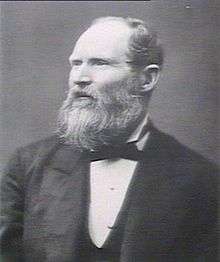James Farnell
| James Farnell | |
|---|---|
 | |
| 8th Premier of New South Wales | |
|
In office 18 December 1877 – 20 December 1878 | |
| Governor | Sir Hercules Robinson |
| Preceded by | John Robertson |
| Succeeded by | Henry Parkes |
| Personal details | |
| Born |
James Squire Farnell 25 June 1825 St Leonards, New South Wales |
| Died |
21 August 1888 (aged 63) Petersham, New South Wales |
| Spouse(s) | Margaret O'Donnell (m. 1853) |
| Children | Frank Farnell |
James Squire Farnell (25 June 1825 – 21 August 1888) was an Australian politician and Premier of New South Wales. Farnell was a hard-working legislator who gave much study to the land question and also tried hard for some years to pass a bill for the regulation of contagious diseases.[1]
Early years
Farnell was born in St Leonards, New South Wales, son of Thomas Charles Farnell, a brewer, and Mary Ann Farnell, daughter of James Squire, an English Romanichal[2] who arrived on the First Fleet and may have been Australia's first brewer. He was educated at Parramatta.[3] At a comparatively early age he began travelling with stock and learnt much about his own colony. The California Gold Rush in California in 1849 led to his visiting America, and he also travelled in New Zealand before finally returning to New South Wales.[1]
Political career
In 1860, Farnell won by-election to the Legislative Assembly for St Leonards, but lost his seat at the next election. He was returned at Parramatta in 1864 and held the seat for 10 years. He became Secretary for Lands in the first Parkes ministry from May 1872 to February 1875, and for a short period was also Secretary for Mines. In 1874 he was defeated for Parramatta, but won St Leonards at a by-election, and held it to 1882.[4]
From December 1876 until October 1877, Farnell was a chairman of committees, but towards the end of that year he organized a "Third Party", in November carried an amendment to the address in reply by two votes, and the Robertson ministry resigned.[1]
Premier
- See also: Farnell ministry
Farnell succeeded in forming a ministry and on 18 December 1877 and took office as the first Australian-born Premier and Secretary for Lands; he was also Colonial Secretary.[5] In October 1878 he brought in a land bill which was defeated on 5 December. Farnell resigned and was succeeded by Parkes. From 1882 to 1885, he represented New England. When the Stuart ministry was formed in January 1883, Farnell was again Secretary for Lands, and showed much patience and tact in his management of the land bill which became law in 1884. In the succeeding Dibbs ministry formed in October 1885 he was Minister of Justice and representative of the ministry in the Legislative Council, but this government lasted only a few weeks. In 1887, he was elected for Redfern in the Assembly and represented that constituency until his death.
He died in Petersham. His wife survived him with 11 children, one of whom, Frank Farnell, was a member of the Legislative Assembly for Central Cumberland at the time of his father's death and later Ryde.[1]
Honours
Farnell declined a knighthood.[1]
Farnell was Grand Master of the Grand Lodge of New South Wales, installed on 1877-12-03.[3]
References
- 1 2 3 4 5 Serle, Percival. "Mr James Squire Farnell (1827–1888)". Dictionary of Australian Biography. Project Gutenberg Australia. Retrieved 6 April 2007.
- ↑ Romani Culture and Gypsy Identity (1997) Thomas Alan et al. University of Hertfordshire Press.
- 1 2 Goodin, V. W. E. "Farnell, James Squire (1825–1888)". Australian Dictionary of Biography. Australian National University. Retrieved 12 August 2013.
- ↑ "Mr James Squire Farnell (1825–1888)". Members of Parliament. Parliament of New South Wales. Retrieved 6 April 2007.
- ↑ "The Colonial Secretaries, 1821-1959". New South Wales Government State Records. Retrieved 12 August 2013.
| Political offices | ||
|---|---|---|
| Preceded by John Robertson |
Premier of New South Wales 1877–1878 |
Succeeded by Henry Parkes |
| Parliament of New South Wales | ||
| Preceded by Edward Sayers |
Member for St Leonards 1860 |
Succeeded by Isaac Shepherd |
| Preceded by John Lackey |
Member for Parramatta 1864–1874 Served alongside: Byrnes/Taylor |
Succeeded by Charles Byrnes |
| Preceded by William Tunks |
Member for St Leonards 1874–1882 |
Succeeded by George Dibbs Bernard Holtermann |
| Preceded by Henry Copeland |
Member for New England 1882–1885 Served alongside: Proctor |
Succeeded by James Inglis |
| Preceded by Arthur Renwick John Sutherland Thomas Williamson |
Member for Redfern 1887–1888 Served alongside: Schey, Stephen, Sutherland |
Succeeded by James Howe |